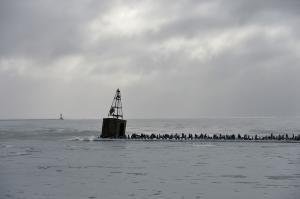WASHINGTON, July 14 (UPI) — Last week, few people — even inside academic circles — had heard of Valentina Zharkova, a professor of mathematics at Northumbria University in England.
This week, her name is plastered all over the Internet. That’s because she’s behind new research suggesting a “mini ice age” awaits Earth in the 2030s as the sun’s solar activity goes into a prolonged lull.
For a variety of reasons, news of the study has quickly reverberated across the world wide web. Not surprisingly, climate-change deniers regurgitated the headline with gleeful gusto.
The only problem with this string of events is that the study’s premise might not be true.
It’s always nice to see the public take an interest in science. But it’s problematic when that science is misrepresented, flawed or even worse, dishonest.
According to a number of climate experts, Zharkova’s work is at least two of those three things.
In fairness, Zharokova’s study didn’t directly predict a miniature ice age. Her work focuses on solar activity. She suggests the irregular heartbeat governing the sun’s electromagnetic activity is about to skip a few beats.
More accurately, Zharkova says the magnetic waves that cause sunspots exist as two divergent — and competing — frequencies. These frequencies will soon cancel each other out, she says, leading to a reduction in radiation hurled towards Earth.
Regardless, news stories tended to focus on the possibility of an upcoming ice age.
At least part of the blame lies with a National Astronomy Meeting, held last week in Llandudno, Wales. The organization sent out the press release that helped shine the spotlight on Zharokova’s research — which has not been published in a peer-reviewed journal.
But if Zharokova wanted to distance herself from dubious climatic predictions, she hasn’t helped her cause. She recently went on record questioning the consensus of anthropogenic global warming. She believes the sun’s fluctuating output plays a greater role in influencing temperature than does the greenhouse gas effect.
“I am not convinced with the arguments of the group promoting global warming of an anthropogenic nature,” Zharkova told The Washington Post.
For this reason and others, Zharkova predicts a reduction in solar radiation to precipitate a drop in global temperatures, similar to the last mini ice age, or Maunder Minimum, that hit Earth in the mid-1700s and caused several decades of harsh winters in the Western Hemisphere.
But Zharokova is mostly isolated in her conclusions on the sun’s climatic effects, then and now.
Recent studies suggest a slowdown in solar radiation will have a minimal effect on upward-trending global temperatures.
“Any reduction in global mean near-surface temperature due to a future decline in solar activity is likely to be a small fraction of projected anthropogenic warming,” scientists concluded in a recent study published in the journal Nature.
“The effect is a drop in the bucket, a barely detectable blip, on the overall warming trajectory we can expect over the next several decades from greenhouse warming,” Michael Mann, professor of meteorology at Pennsylvania State University, told The Washington Post.
Furthermore, a number of recent studies suggest the so-called Little Ice Age was, as its name suggests, quite small in size and stature — resulting in only small temperature reductions isolated to Europe. It was also, scientists say, mostly the result of an uptick in volcanic activity, which spewed sun-blocking gas and ash into the atmosphere.
One of the struggles for scientists, research universities, scientific journals and the organizations that support them, is the balance act between drawing attention to important but underfunded work and ensuring megaphones aren’t given to those making unfounded claims. Thankfully, publicity often works as a double edged sword.

COMMENTS
Please let us know if you're having issues with commenting.